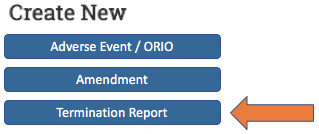Which is Not a Reason for Continued Irb Contact
IRB Scheduled Continuing Review (SCR)
Per federal regulations outlined in 45 CFR 46.109(e), an approved, federally-sponsored human subjects study must be reviewed, at least annually, by the IRB. For this continuing review, the IRB reviews the:
- Study protocol;
- Informed consent and other documentation or materials; and
- Any adverse events (AEs) or other reportable events (ORIOs) that occurred during the current approval period.
The IRB may recommend modifications or updates to a study upon continuing review.The continuing review process is not used to update an IRB application at the time of renewal.The study team would submit these changes for IRB review via the amendment process.
![]() Under the revised Common Rule, the following no longer requires continuing review:
Under the revised Common Rule, the following no longer requires continuing review:
- Most of the new studies (i.e., those approved after January 21, 2019) that qualify for expedited review
- Studies approved prior to January 21, 2019 that have completed subject intervention/interaction, where the activity is limited to either the final analysis of identifiable data/biospecimens or involves accessing follow-up clinical data from procedures that subjects would undergo as part of clinical care.
The IRB may require continung review for projects, but must document the reason to do so. Common reasons include, but are not limited to:
- The project sponsor requires continuing review
- The project involves additional regulatory oversight, such as conflict of interest (COI) management.
- The research will be conducted internationally or at non-UM sites
- An amendment or incident report reveals new findings that require additional oversight
- The investigator has had previous serious non-compliance or a pattern of non-serious non-compliance
![]() Continuing review is required for research that is regulated by the Food & Drug Administration (FDA).
Continuing review is required for research that is regulated by the Food & Drug Administration (FDA).
SCR Requirements
At U-M the continuing review process is called a Scheduled Continuing Review (SCR). The SCR is an online form completed in U-M's eResearch Regulatory Management (eRRM) system by a member of the study team to:
- Report the current status of the research project to the IRB, inclduing the number of subjects enrolled; and
- Initiate the IRB review for the renewal of approval prior to the study's expiration date.
Study teams receive an automated email from eRRM at 90, 60, and 30 days prior to a study's expiration date as a reminder to submit an SCR, but it is the Principal Investigator's responsibility to ensure that the SCR is submitted in a timely manner for IRB review.
Lapse in IRB Approval
A human subjects study must retain active IRB approval until the study team has completed the work (e.g., all papers submitted and analyses completed) on the research, or until the data has been completely deidentified, including the destruction of any keys or codes linking the data to subject identifiers. If the study requires continuing review and the approval period expires (i.e., lapses), all research activity must stop until IRB approval is re-established. This means no new subjects may be enrolled in the study, no data may be collected, and data analysis is discontinued. The only exception is when stopping the activity would jeopardize the welfare of the subject. This exception is very rare for the type of research reviewed by the IRB-HSBS.
If the lapse is less than three (3) months, the Prinicpal Investigator (PI) or study team may submit an SCR to initiate an IRB review for approval. If greater than three months, the IRB may require a new application. The IRB has the authority to require a full re-review of the study in cases of lapsed approvals.
Terminating a Study at SCR
Principal Investigators have the option to terminate the study at the time of Scheduled Continuing Review (SCR) if the study is complete (e.g., activity limited to data analysis). The SCR process will direct the PI (or Faculty Advisor for studies where a student serves as the PI) to complete a Termination Report in eRRM to close the project
"No Continuing Review" Annual Touchpoint
For studies that qualify for no continuing review ("No CR"), reporting the project status helps the IRB to monitor the study's progress. To facilitate this, anAnnual Touchpoint email is sent to the study team on the anniversary of the qualifying study's approval date.
This system email acts as an annual reminder for study teams to take action, as needed, to update the status of their study through the amendment, incident reporting, or termination processes. The U-M IRB Offices review the Annual Status Report responses and IRB staff may contact investigators if additional information or action by the study team is needed.
Source: https://research-compliance.umich.edu/continuing-review-process

0 Response to "Which is Not a Reason for Continued Irb Contact"
Post a Comment